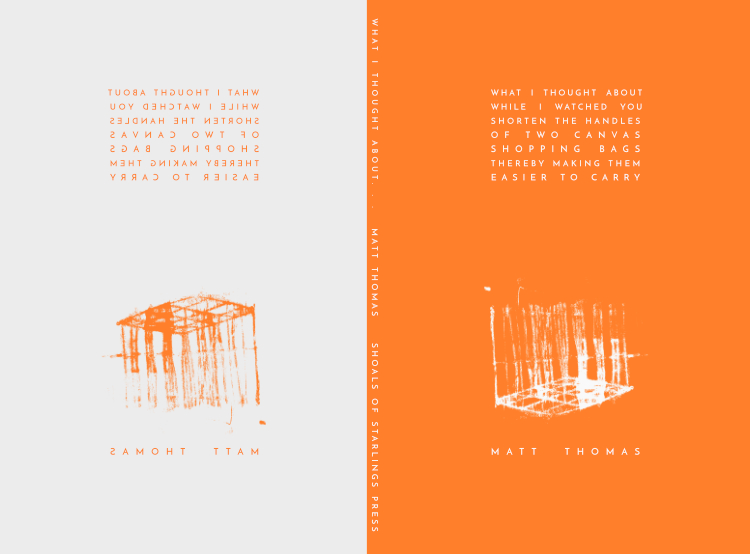In Matt Thomas’s poetry things are rarely what they seem. Thomas is a visual artist as well as a poet and he brings both a sensitivity to appearances, and a visual sensibility, to his modern lyricism. The title of this collection brings to mind Raymond Carver and, like Carver, Thomas pokes around in the margins of the ordinary, the trivial and seemingly inconsequential. Ordinary things, stray memories, items of clothing, leaves awash in the gutter, domestic details, a train ride, capture his attention and he turns these observations into illuminations of what lies behind the day-to-day.
“Silk shirt”, for example, is about a silk shirt only insofar as the shirt he is wearing provokes a memory about another item of clothing, “a sharkskin, / ten dollar, / Detroit suit” he wore as a youth. He tells us this suit is the only one “I ever looked good in” and immediately we shift to different territory: memory, yes; a specific memory, for sure; but also, a more general sense of time passing, of things lost, of things getting “out of hand”. We age, gain weight, lose hair and today’s silk shirts, however natty, can never make us look that good again: that old, sharkskin suit simply doesn’t suit anymore. Thomas shows us how this stuff, the stuff that surrounds us, can alienate, can suffocate, can make us “feel / tired, heavy, encased” as he puts it in another poem. Look at that word, “encased”, feel its weight, its root, its direction of travel, its intimation of mortality.
What’s a man going to do? Why, he just gets on with it! Because what we have here is not a lame nostalgia for a past that never really was in the first place; nor is this a sullen morbidity, but a way of treating the quotidian as a bed of discovery. This is a poetry of maturity, not a bleating confessional. The memories, the things, the mundane events, are significant precisely because they point to what is really going on, now. If only we would learn how to look.
In “Tansy”, the smell of that yellow flower, held in the hand of an unnamed companion, is “a stink” which, with the colour, evokes an older yellow of a grandmother’s upholstery, “yellow with experience / a sweet, almost rotten smell / meat / piss / and a little bit of something else.” And here, as the edges of memory blur, the upholstery becomes a personification of old age.
There’s yellow again, in the next stanza: “a yellow top” the companion may, or may not, have been wearing at the time, shines a reflective light on the previous, unpromising material. The smelly flowers, dank yellow upholstery, rot, meat and piss, are revealed as a kind of conceit whereby a different, altogether brighter poem emerges, one in which the narrator, by virtue of the companion’s presence, “might look back / on any one of those moments … and call it love / at first sight”. It is a love poem, then, with antecedents that can be traced back to Donne.
In “Train”, the poet sits “facing the wrong way” and watches “the world recede / from us like a wake”. He checks his Twitter account “just in case”. His companion faces “the right way” and watches “the world become”. This is clever and turns an ordinary train journey, with its litter, detritus, boredom and daydreaming, into a meditation on beginnings and endings, on time, on death. But it is not merely clever: it’s insistent. It insists on attention and when it inevitably bursts in through a Tweet - “Michael K Williams has died” – our travellers are forced to muse on the world’s cruelty - it is “brutal and some people are not / meant for it” – even as the train rattles through the bucolic, picture-book scenery.
This is poetry measured, distilled and controlled by a fine intelligence. Metaphor is used but little, always judiciously, and is never allowed to cloud observation. There is always more going on than meets even this poet’s sharp eye. He knows it, and his skill lies in peeling back the layers to reveal it.

